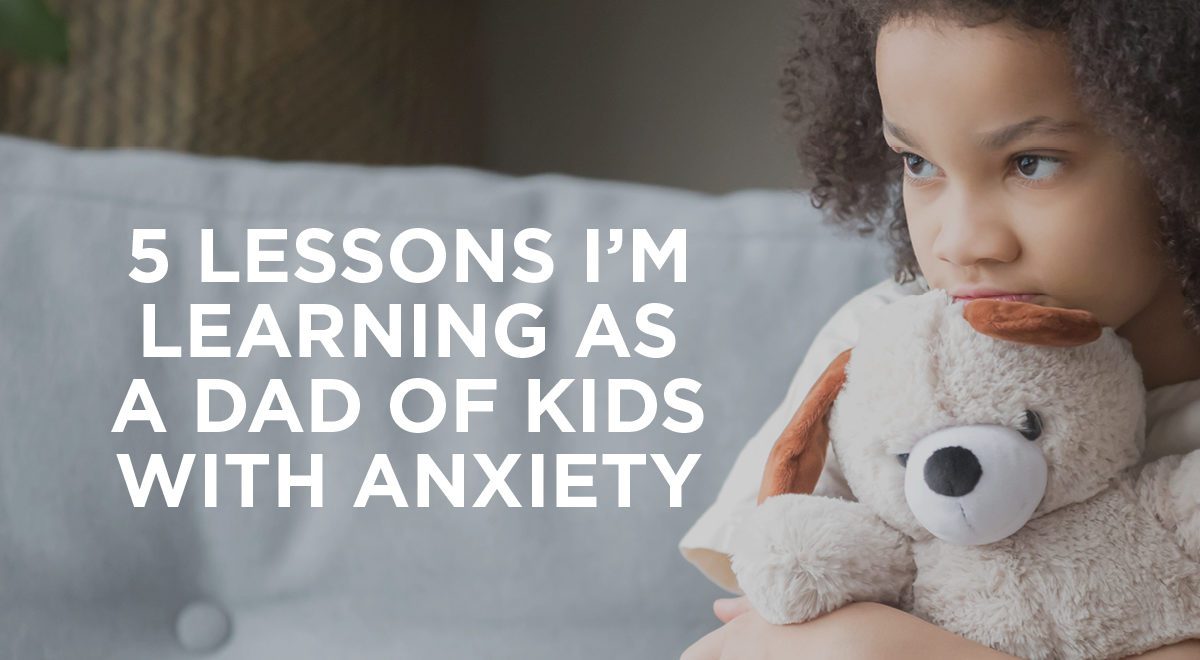Many kids struggle with anxiety today, not a mere nervousness, but rather what can be an overwhelming and paralyzing fear. In this blog post, I share a few lessons I’m learning on how to help my own kids who struggle with anxiety in hope that they help you navigate the anxiety that might occur in your ministry.
Anxiety is an ever-present foe in my family, one which I despise. Two of my kids struggle with anxiety pretty much on a daily basis, and as their father, it destroys me to see it. Anxiety, like depression, is a word we throw around quite a bit, so let me explain what I mean, or perhaps rather what I don’t mean.
When I say my kids struggle with anxiety, I don’t mean that they worry some or that they get nervous on occasion. Oh, they do worry and get nervous, but it’s much more than that. For most of us, we can control those feelings. We can make sense of them and keep them in proportion. But my kids can’t. Their anxiety overwhelms them. It plagues their minds and crushes their hearts. That’s why I say they struggle with anxiety. They don’t want to be anxious and they try to fight against it, but it is a battle they often lose. They don’t just have anxiety; anxiety has them.
For my family, we see anxiety manifest itself in so many ways: going to school, being in new situations, experiencing changes in our routine, knowing where mom is, and even seeing a friend in the park. Handling these episodes of anxiety is challenging enough for me, let alone knowing how to help my kids during them. I tend not to be a worrier, so it’s hard for me to relate with what they are experiencing. Plus, I’m a problem-solver; I want to fix what is “broken” so I often come at these episodes from that unrealistic posture. Add to the mix that I am a selfish sinner who often lacks the grace and patience my kids need and deserve, and it is a formula of failure more than one of success.
But in God’s kindness, He is teaching me—ever so slowly—how to support my kids during and through their anxiety. Here are five lessons He’s driving into me:
1. Knowing what not to say matters … greatly. We mean well, but often our desire to say something outweighs the wisdom of what we actually say. The result is that we can offer what comes across as platitudes. I’ve told my kids, “don’t worry,” but I can see how that rings hollow. Telling them not to worry, as if they can but are choosing not to, just doesn’t help. In that moment they cannot not worry. Another one I’ve said is, “everything is OK.” While I know that to be true, my kids don’t feel that truth in the moment. Rather, it’s better for me to acknowledge their struggle. Acknowledge that what they’re experiencing is difficult and let them know I’m sorry they are experiencing it, but I will be with them during it and through it. “This stinks. I’m so sorry you are feeling this right now. I’m here with you. We will get through it.”
Likewise, be careful about quoting Bible passages, such as Matthew 6:25-34, Philippians 4:6-7, or 1 Peter 5:7, as if a kid struggling with anxiety only needs to understand and believe these verses to be OK. Yes, the gospel is the ultimate answer for all that is broken in the world, but just as we wouldn’t quote Psalm 103:3 instead of giving penicillin to a child with pneumonia, we shouldn’t only give Bible verses to our kids. Rather, we want to remind our kids of God’s sovereign power and His love for them. We want to encourage our kids that the gospel says that in Christ, they are fully loved and accepted by God, no matter what—even if they might feel like a failure because of their worries and doubts. Give them life through God’s Word, not potential, albeit accidental, condemnation.
2. Patience is not a virtue; patience is a necessity. Perhaps my greatest struggle with my kids’ anxiety is my lack of patience. It’s actually a problem for me in general, but when it comes to helping kids navigate anxiety, patience is not a virtue, it’s a must. So the best thing for us to do is to pray up. Remind ourselves that the kid doesn’t want to be anxious—it’s not a choice. Ask God to help frustration give way to compassion. Step away for a minute if possible and needed. Getting frustrated, or even mad as I have done at times, doesn’t help anyone—you, or especially the kid.
3. Find and Encourage Tools that Help. My kids have been helped a great deal with tools taught or given to them by counselors. Perhaps it is saying something or focusing thoughts on something. Or perhaps it is squeezing a stress ball. Having tools to use can greatly help a child experiencing anxiety, but there may be times when the anxiety is so severe, it’s difficult to even get the kid to use those tools. Be ready for that. For me, it only adds to my frustration, so I need to be mentally and spiritually ready to help my kids help themselves when they refuse to use the tools they have been given. The flip side of this is that a kid who has found tools that work can provide help and encouragement to others. We have seen this with our kids helping one another when one is struggling and it is a beautiful reminder of God’s kindness to use any bad for His glory (see Gen 50:20).
4. Routines Give Comfort. The best way to help with anxiety is to help your kid proactively. One of the best methods I have found is to create and guard routines as much as possible. For my kids, new and different prompt panic. The fear of the unknown is very real for them. As a result, we try to guard our family routine as much as we can. Comfortable, familiar rhythms are a balm on the mind and heart of a child who struggles with anxiety. But there will be times when new situations cannot, and should not, be avoided. Prepare your kid for the upcoming event by reviewing the schedule, talking about specific areas that might prompt anxiety, and planning on what tools would be most helpful.
5. Lighten the load. In light of the last tip, do what you can to lighten the load. Keep life as consistent and simple as possible. This means saying “no” to plenty of things, even good things. For our family, this might mean abstaining from various one-time events that pop up and trying to protect our daily schedule as best as we can (such as dinner time and bedtime). In the classroom, this might mean being extra careful about changing your routine, and when you do, giving any kids who struggle with anxiety plenty of advance notice. Talk them through exactly what will be happening … and be ready to have that conversation more than just once!

Brian Dembowczyk is the managing editor for The Gospel Project. He served in local church ministry for over 16 years before coming to Lifeway. Brian earned an M.Div. from the Southern Baptist Theological Seminary and a D.Min. from the New Orleans Baptist Theological Seminary. He and his family live in Murfreesboro, Tennessee.


 Setting Your GPS for Ministry
Setting Your GPS for Ministry »
»